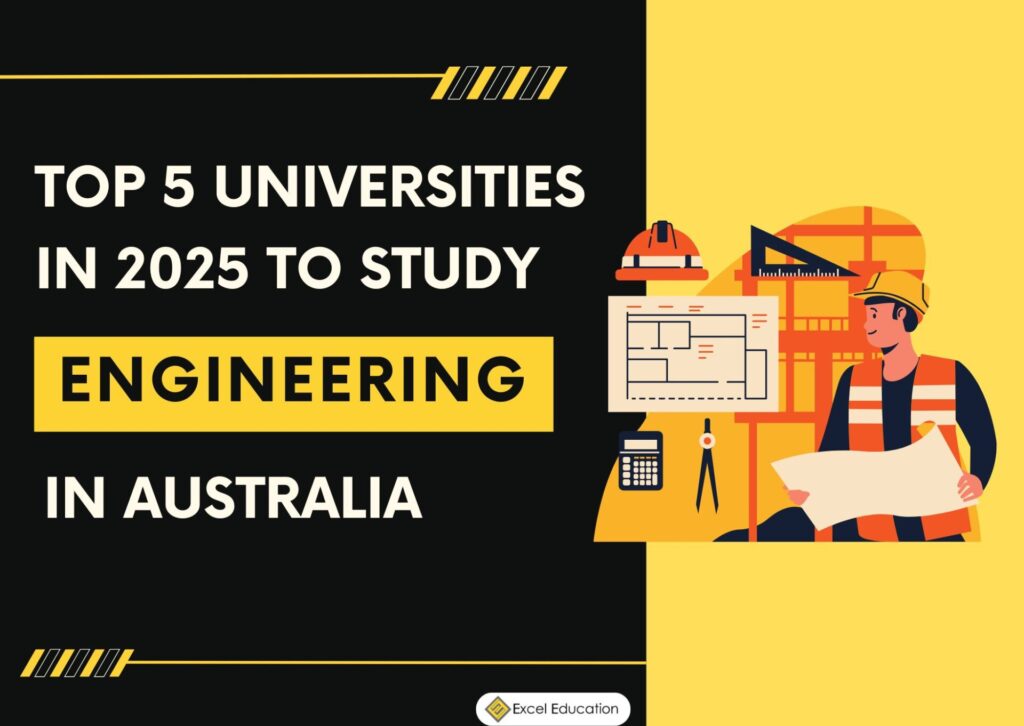
Top Universities in Australia to Study Engineering
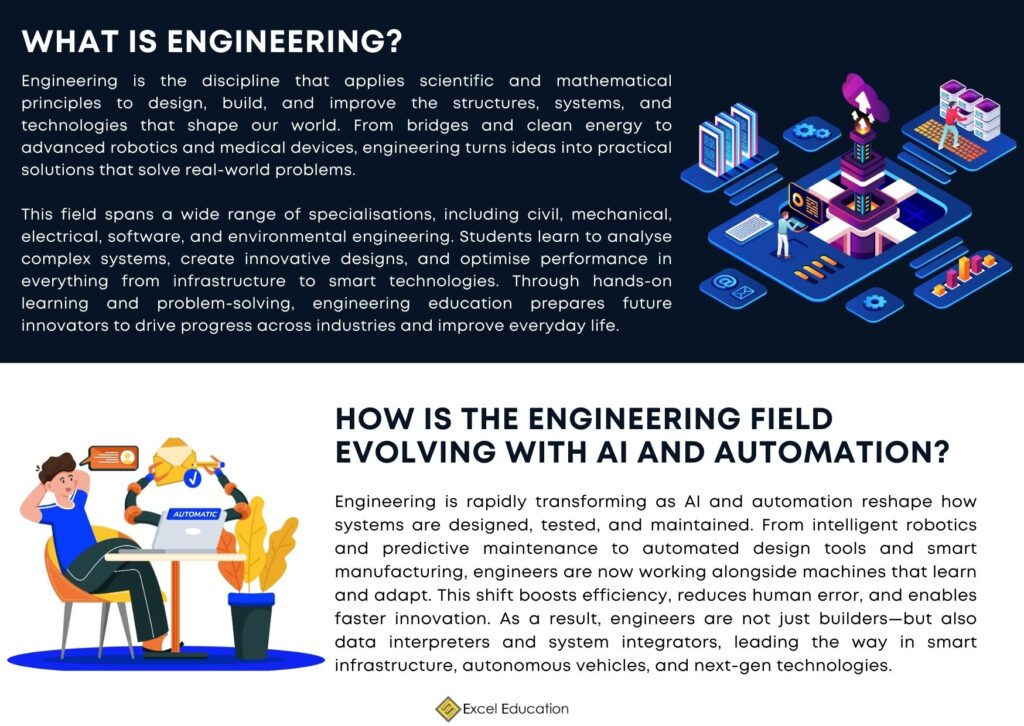
Engineering is the backbone of innovation, powering everything from infrastructure and energy to robotics, space exploration, and climate solutions. For students passionate about solving real-world problems through design, systems, and technology, studying engineering in Australia offers world-class academic training and strong industry connections.
Australia’s top engineering universities offer a wide range of specialisations, including civil, mechanical, electrical, software, biomedical, and environmental engineering. These programs combine rigorous theory with hands-on learning through labs, industry placements, capstone projects, and research partnerships. This will prepare students for high-impact careers in both local and global markets.
What makes studying engineering in Australia especially valuable is the focus on innovation, sustainability, and real-world application. With state-of-the-art facilities, accredited degrees, and close ties to industry leaders, these institutions help students gain not just technical expertise, but also the creativity and critical thinking needed to shape the future.
In this guide, we highlight the Top Universities in Australia to Study Engineering, based on academic reputation, graduate outcomes, and the latest QS World University Rankings by Subject 2025 in Engineering and Technology. Whether you dream of building smarter cities, designing sustainable systems, or developing breakthrough technologies, this is where your engineering journey begins.
Top Reasons to Choose Australia for Your Engineering Degree
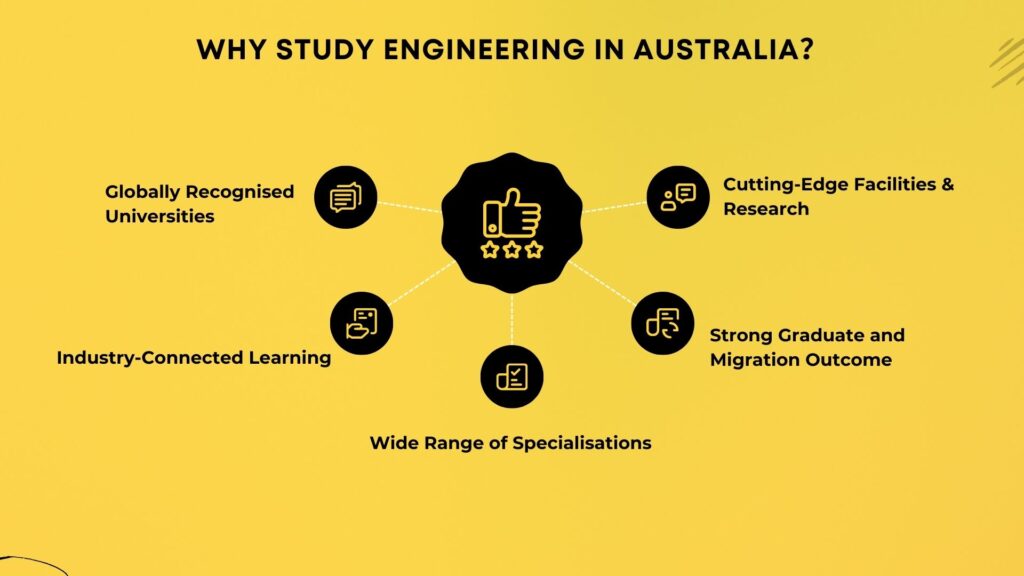
Globally Recognised Universities
- Degrees accredited by Engineers Australia and recognised worldwide
- Consistently ranked among the top in global university rankings
- Known for academic excellence and research innovation
Industry-Connected Learning
- Strong partnerships with leading engineering firms
- Internship and co-op programs integrated into degrees
- Real-world projects and case-based learning opportunities
Wide Range of Specialisations
- Choose from civil, mechanical, software, aerospace, and more
- Programs tailored to meet global industry demands
- Interdisciplinary options with sustainability, AI, or robotics
Cutting-Edge Facilities & Research
- Access to labs, maker spaces, and advanced tech hubs
- Opportunities to join engineering innovation and research projects
- Collaboration with academic and industry researchers
Strong Graduate and Migration Outcome
- Strong employment prospects for engineering graduates
- Eligible for Post-Study Work Visa upon graduation
- Many specialisations listed on Australia’s Skilled Occupation List
Specialisations and Career Opportunities
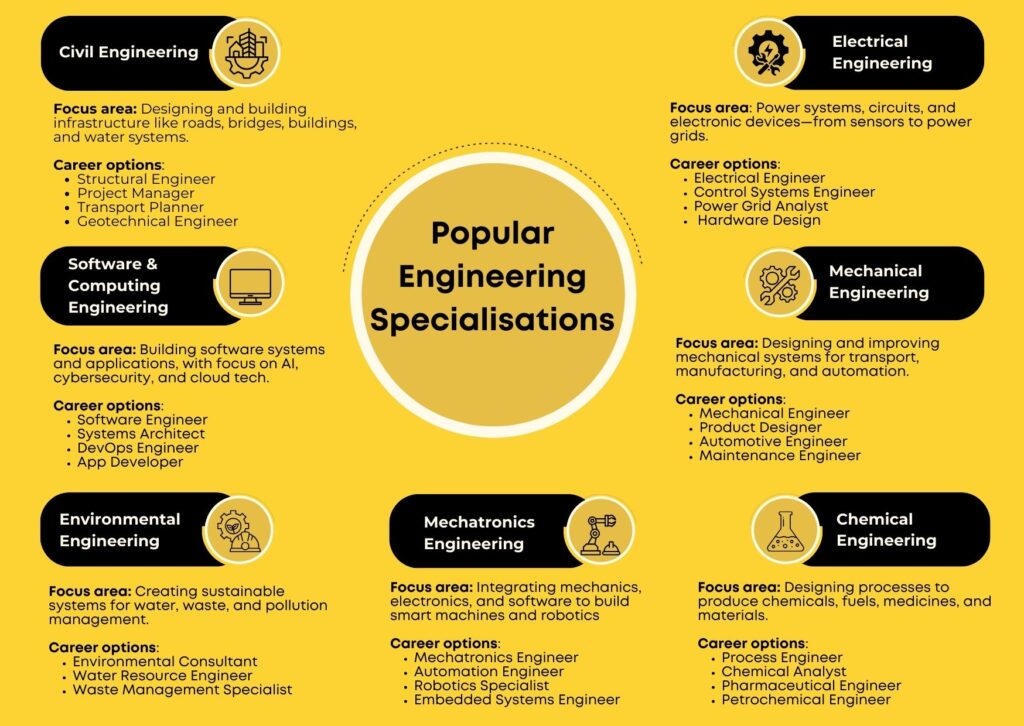
Choosing an engineering specialisation can feel overwhelming, especially when you’re studying in a new country. But don’t worry, you’re not alone! Here’s a guide to help you figure out which path might suit you best.
Step 1: Think about what you actually enjoy.
Are you the type who loves solving math problems? Do you get excited by how things move, how apps work, or how buildings are made? Maybe you’re into sustainability, or tech, or figuring out how things are built from the ground up. Your interests are a great starting point.
Step 2: Get to know your options
The main engineering branches in Australia are things like Civil, Mechanical, Electrical, Chemical, Software, Mechatronics, and Environmental. Each has its own vibe. Civil is all about structures and cities, while software focuses on code and digital systems. Do some research, speak to people and find out which works best for you. However do not overthink as you can always change your specialisation while studying the engineering degree midway.
Step 3: Think about your future too.
Where do you see yourself working after uni? Some specialisations (like software, machine learning or mechanical) are booming in terms of jobs. Look at what’s in demand in both Australia and your home country. If you’re thinking long term in Australia, some specialisation might even support your visa or PR goals.
Step 4: Use your first year to explore.
Most unis let you try general engineering subjects before choosing a specialisation. Go to info sessions, join student clubs, talk to older students, and ask lots of questions. You’ll learn way more from experience than just reading course descriptions.
Step 5: Don’t stress
You’re not locked in forever. Plenty of students change their minds once they get a feel for different areas. Your degree is just the beginning, and the skills you build will open doors in more ways than you can imagine. So stay curious, try new things, and pick a path that feels right for you.
If you are interested to know the basics of some specialisations available in an Engineering program, below are some popular options and their career options.
Civil Engineering
Focus area: Designing and constructing infrastructure such as buildings, bridges, roads, and water systems that support everyday life.
Why is it popular: Civil engineering is foundational to urban development and consistently in demand for government and private infrastructure projects.
Career options:
- Structural Engineer
- Project Manager
- Transport Planner
- Geotechnical Engineer
Electrical Engineering
Focus area: Working with electrical systems, circuits, power grids, and electronic devices, from small sensors to large-scale power networks.
Why is it popular:It’s essential to everything from renewable energy to smart devices, making it a core field with diverse job prospects.
Career options:
- Electrical Engineer
- Control Systems Engineer
- Power Grid Analyst
- Hardware Designer
Software and Computing Engineering
Focus area: Developing applications, designing software systems, and exploring areas like AI, machine learning, cybersecurity, and cloud tech.
Why is it popular: As tech continues to drive innovation, software engineers are in high demand across nearly every industry.
Career options:
- Software Engineer
- Systems Architect
- DevOps Engineer
- App Developer
Mechanical Engineering
Focus area: Designing, analysing, and improving mechanical systems used in manufacturing, transport, and automation.
Why is it popular: Its versatility allows engineers to work in multiple sectors, including automotive, aerospace, and energy.
Career options:
- Mechanical Engineer
- Product Designer
- Automotive Engineer
- Maintenance Engineer
Environmental Engineering
Focus area: Designing systems to improve sustainability, manage waste, purify water, and reduce pollution.
Why is it popular: It addresses pressing global issues like climate change, making it a meaningful and future-oriented career path.
Career options:
- Environmental Consultant
- Water Resource Engineer
- Waste Management Specialist
Chemical Engineering
Focus area: Using chemistry, biology, and physics to design processes for producing chemicals, fuels, pharmaceuticals, and materials.
Why is it popular: It offers cross-industry relevance, from biotech and energy to cosmetics and food manufacturing.
Career options:
- Process Engineer
- Chemical Analyst
- Pharmaceutical Engineer
- Petrochemical Engineer
Mechatronics Engineering
Focus area: Combines mechanical, electrical, and software engineering to design intelligent machines like robots and automation systems.
Why is it popular: Ideal for students interested in robotics, smart manufacturing, and the future of intelligent devices.
Career options:
- Mechatronics Engineer
- Automation Engineer
- Robotics Specialist
- Embedded Systems Engineer
Engineering Accreditation and Australia Migration Pathways for International Students
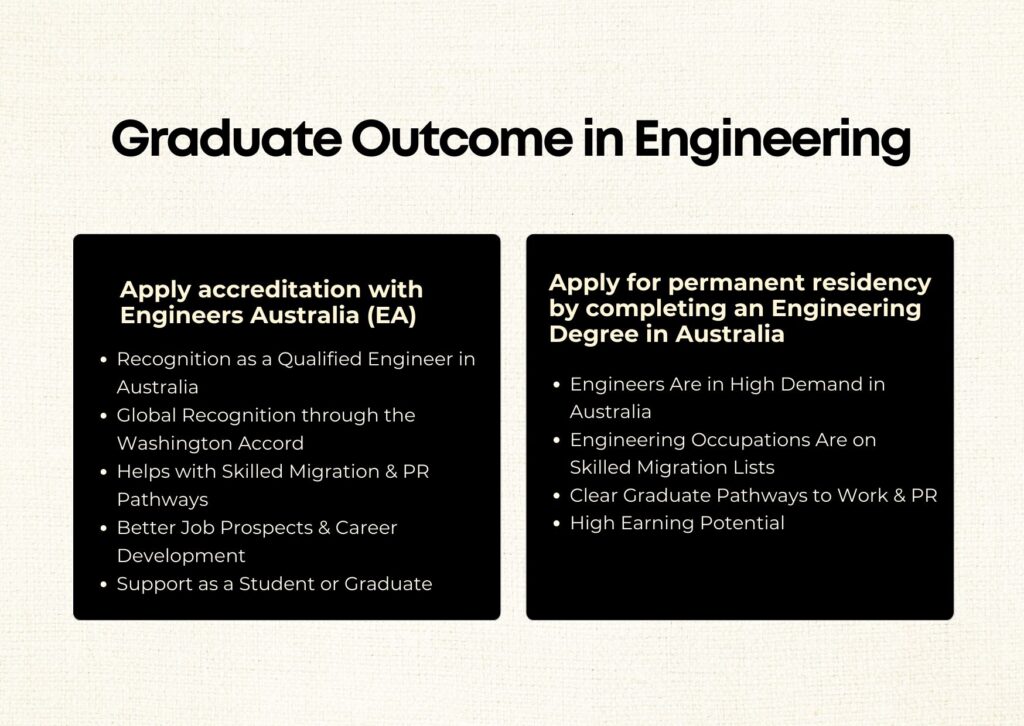
Engineering has long been one of the most popular and high demand degrees among international students in Australia. Its strong job prospects, global recognition, and direct alignment with skilled migration pathways make it a top choice for those aiming to build a long-term future in the country.
Many students choose engineering not only for its career potential, but also because it is listed across multiple PR-eligible occupations, making it a strategic option for migration. Below is some key information for graduates seeking to establish their engineering career in Australia or to apply for migration.
Apply accreditation with Engineers Australia (EA)
If you’re studying (or have completed) an engineering degree in Australia, you’ll probably hear a lot about Engineers Australia (EA). But what exactly is it, and why does it matter?
EA is the professional body that represents engineers nationwide. They accredit engineering programs, maintain professional standards, and offer recognition to qualified engineers through various membership levels. Here’s why accreditation with EA is important:
Recognition as a Qualified Engineer in Australia
Being accredited means you’ve met the national competency standards for engineers. This recognition is essential if you want to:
- Work as a professional engineer in Australia
- Apply for jobs that require chartered or professional status
- Join engineering industry networks
Global Recognition through the Washington Accord
EA accreditation is internationally recognised through agreements like the Washington Accord, which means your degree (or professional status) is accepted in other member countries like USA, UK, Singapore, and more. This is a big deal if you want to work overseas or with multinational companies!
Helps with Skilled Migration & PR Pathways
Applying for migration skills assessment through Engineers Australia is one of the most common routes for engineers seeking, permanent residency, skilled visas or employment sponsorships
Better Job Prospects & Career Development
EA membership (especially if you become a Chartered Professional Engineer) can boost your career by:
- Making you more competitive in the job market
- Giving access to professional development resources
- Connecting you with mentors, networking events, and job boards
Support as a Student or Graduate
You can even join EA as a student member for free, giving you access to career advice, workshops & events, and discounts on short courses or certification programs.
Apply for permanent residency by completing an Engineering Degree in Australia
Engineering isn’t just a high-demand field, it is also one of the most popular study choices for international students who want to live and work in Australia long-term. Below are some key factors to consider.
Engineers Are in High Demand in Australia
Australia has a skills shortage in many engineering disciplines, especially in areas like:
- Civil and structural engineering
- Electrical engineering
- Mechanical and mechatronics
- Software and Computing related engineering
- Environmental and mining engineering
This makes engineering a strong option for students aiming to enter the job market and secure work visas or permanent residency. To understand which specialisations are in high demand in each state, you can visit the Occupation Shortage List designed by the Australian government.
Engineering Occupations Are on Skilled Migration Lists
The Skilled Migration List (often called the Skilled Occupation List) is a list of jobs that Australia needs to fill with skilled workers. This is either because there aren’t enough local workers or because they’re important to the country’s economic growth.
If your engineering specialisation is on this list, it means you may be eligible to apply for a skilled visa, permanent residency (PR), or employment sponsorship in Australia.
Many engineering roles appear on Australia’s Skilled Occupation List (SOL) which are used for:
- Skilled Independent Visas (subclass 189)
- State-sponsored visas (subclass 190)
- Graduate visas and employer-sponsored visas
This means engineers are eligible for points-based migration and state/territory nominations which has huge advantages when applying for PR.
Clear Graduate Pathways to Work & PR
Graduates with an engineering degree from an Australian university can:
- Apply for the Temporary Graduate Visa (subclass 485) to gain local work experience
- Use that experience to meet criteria for skilled migration
- Be eligible for regional visas if they study and work in certain parts of Australia
High Earning Potential
Engineering roles often come with strong starting salaries and long-term earning growth. This makes it not only a smart migration pathway, but a financially rewarding one too.
Top Recommended University to Study Engineering in Australia
Australia is home to some of the world’s most respected engineering schools, offering cutting-edge facilities, accredited programs, and strong ties to industry. Whether you’re interested in building sustainable infrastructure, advancing renewable energy, or designing smart technology, choosing the right university can shape your future success.
In this guide, we highlight the most recommended universities for engineering studies in Australia based on academic excellence, global rankings, graduate outcomes, and real-world experience. Explore the top institutions that are preparing the next generation of problem-solvers, innovators, and engineers to shape a better world.
The University of New South Wales (UNSW Sydney)
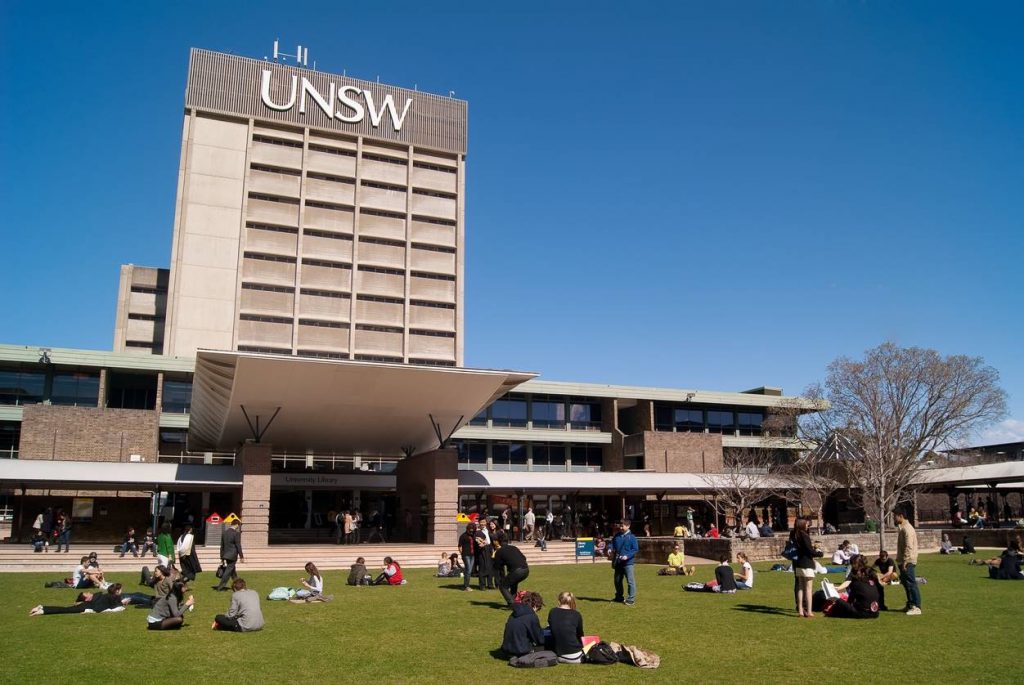
UNSW Sydney is consistently ranked among the top engineering universities in Australia and globally, known for its strong emphasis on innovation, industry integration, and real-world impact. As part of the prestigious Group of Eight, UNSW’s Faculty of Engineering is the largest in Australia and offers one of the broadest ranges of specialisations—from civil, mechanical, and electrical engineering to emerging fields like renewable energy, robotics, and biomedical engineering.
At UNSW, engineering students benefit from hands-on learning through state-of-the-art labs, industry placements, and project-based courses designed in collaboration with leading companies. The university’s ChallENG program connects students with real industry challenges, encouraging creative thinking and collaboration from day one.
With globally accredited degrees, access to groundbreaking research, and strong graduate employment outcomes, UNSW equips students with the skills and mindset to become the engineers of the future—ready to tackle global challenges and drive technological progress across sectors.
QS Rankings by Subject in 2025 | #1 in Australia, #25 in the World |
Program | Bachelor of Engineering (Honours) |
Intake | February, May, September |
Fees (indicative in 2025) | AUD$58,500 per-year |
Duration | 4 years |
For more information on the table presented above, contact us now!
The University of Queensland (UQ)
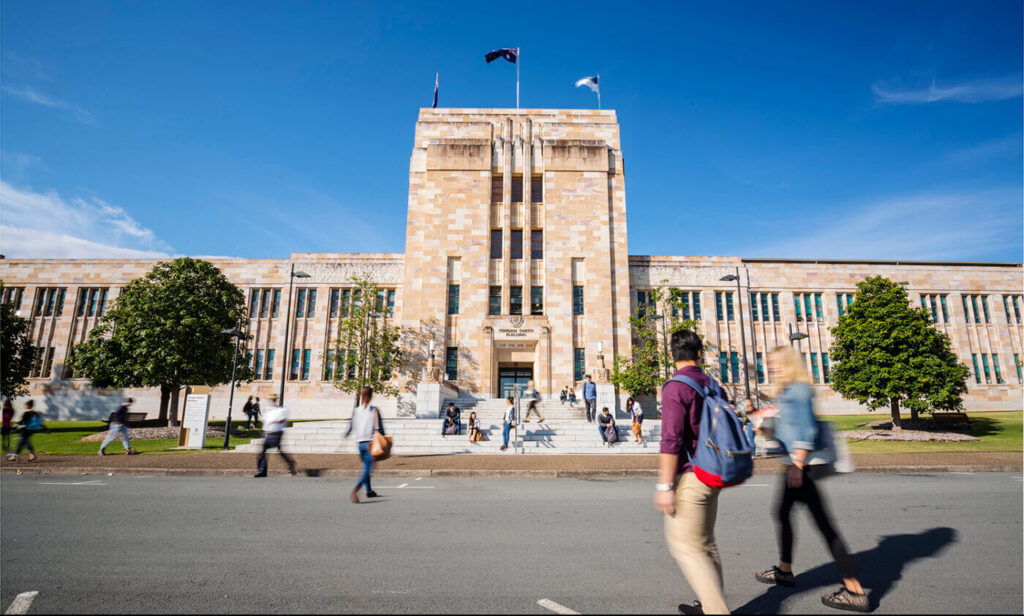
At UQ, engineering isn’t just about mastering equations or building structures—it’s about tackling the world’s toughest problems with creativity, precision, and purpose. Located in Brisbane, UQ blends over a century of academic tradition with forward-thinking research to offer students a uniquely future-ready engineering education.
Students at UQ benefit from a learning environment that encourages big ideas and practical outcomes. Whether designing renewable energy systems, developing robotics for medical use, or optimising water infrastructure, students engage with challenges that matter. The faculty’s close links with industry and research institutes—like the Australian Institute for Bioengineering and Nanotechnology (AIBN)—open doors to high-impact projects and global collaboration.
With flexible specialisations, access to cutting-edge facilities, and a strong emphasis on sustainability and innovation, UQ prepares engineering graduates not just to adapt to the future, but to help shape it.
QS Rankings by Subject in 2025 | #4 in Australia, #68 in the World |
Program | Bachelor of Engineering (Honours) |
Intake | February, July |
Fees (indicative in 2025) | AUD$53,760 per-year |
Duration | 4 years |
For more information on the table presented above, contact us now!
Australian National University (ANU)
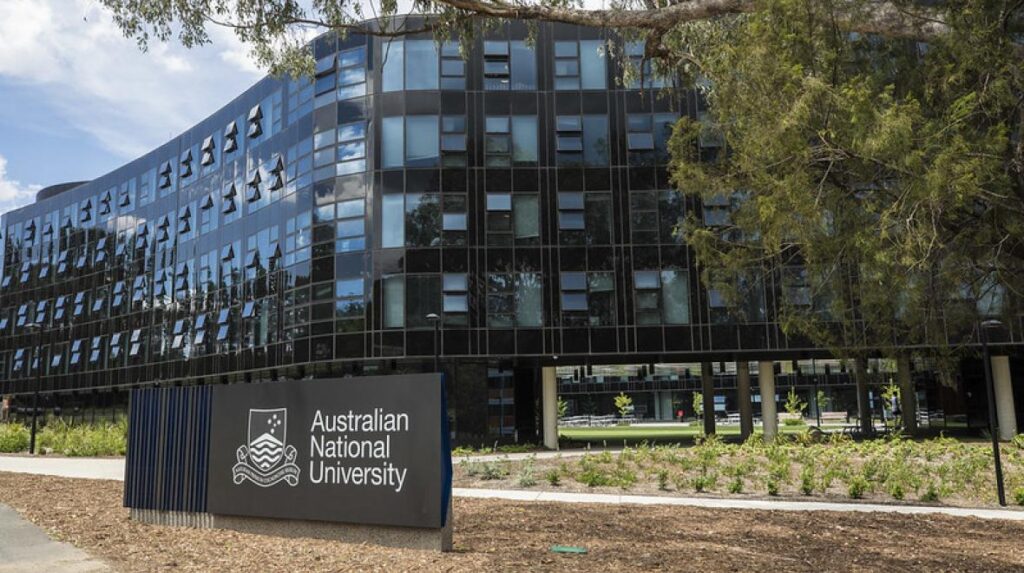
The Australian National University (ANU), based in Canberra, is widely recognised as Australia’s national university and one of the world’s leading institutions for research and education. Known for its academic excellence, global outlook, and strong links to government and science, ANU attracts top students and researchers from around the world.
Engineering at ANU is rooted in a systems-thinking approach. Students don’t just learn how to build things—they learn how engineering intersects with the environment, society, and emerging technologies. From sustainable energy and mechatronics to advanced computing and materials innovation, the programs are designed to equip future engineers with both technical capability and a strong ethical foundation.
What makes ANU stand out is its emphasis on research-led learning and global perspective. Students benefit from access to national research infrastructure like the ANU MakerSpace and the Heavy Ion Accelerator Facility, as well as connections to government, policy institutions, and leading scientific bodies. This makes ANU an ideal choice for those who want to shape the future of engineering through curiosity, critical thinking, and meaningful innovation.
QS Rankings by Subject in 2025 | #5 in Australia, #76 in the World |
Program | Bachelor of Engineering (Honours) |
Intake | February, July |
Fees (indicative in 2025) | AUD$53,700 per-year |
Duration | 4 years |
For more information on the table presented above, contact us now!
University of Technology Sydney (UTS)
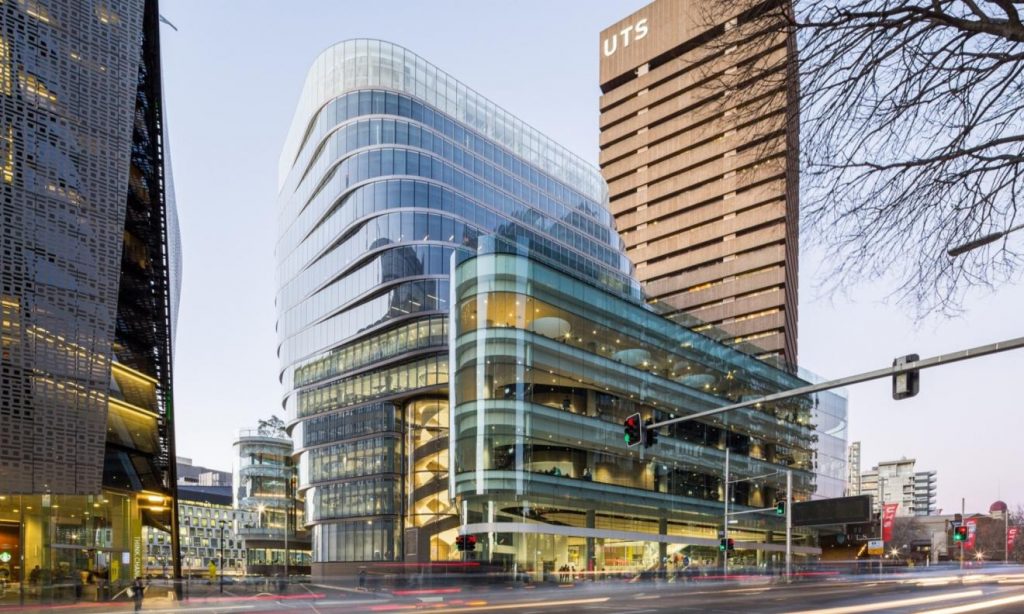
Located in the heart of Sydney’s innovation district, the University of Technology Sydney (UTS) is known for its practice-led teaching and strong industry collaboration. As one of Australia’s top modern universities, UTS focuses on equipping students with the skills, experience, and mindset needed to thrive in rapidly evolving technical fields—including engineering.
Engineering programs at UTS are designed around real-world application and emerging technologies. Students can specialise in areas such as civil, electrical, mechanical, biomedical, or software engineering, while gaining hands-on experience through labs, team projects, and design challenges that reflect industry needs. Courses are regularly updated in partnership with industry to ensure graduates are prepared for the future of work.
What sets UTS apart is its deep integration with industry partners, offering students opportunities to engage in internships, cooperative education, and innovation-driven projects from early in their degrees. With a strong focus on sustainability, entrepreneurship, and creative problem-solving, UTS Engineering prepares graduates not only to adapt to change—but to lead it.
QS Rankings by Subject in 2025 | #8 in Australia, #107 in the World |
Program | Bachelor of Engineering (Honours) |
Intake | February, July |
Fees (indicative in 2025) | AUD$52,410 per-year |
Duration | 4 years |
For more information on the table presented above, contact us now!
RMIT University
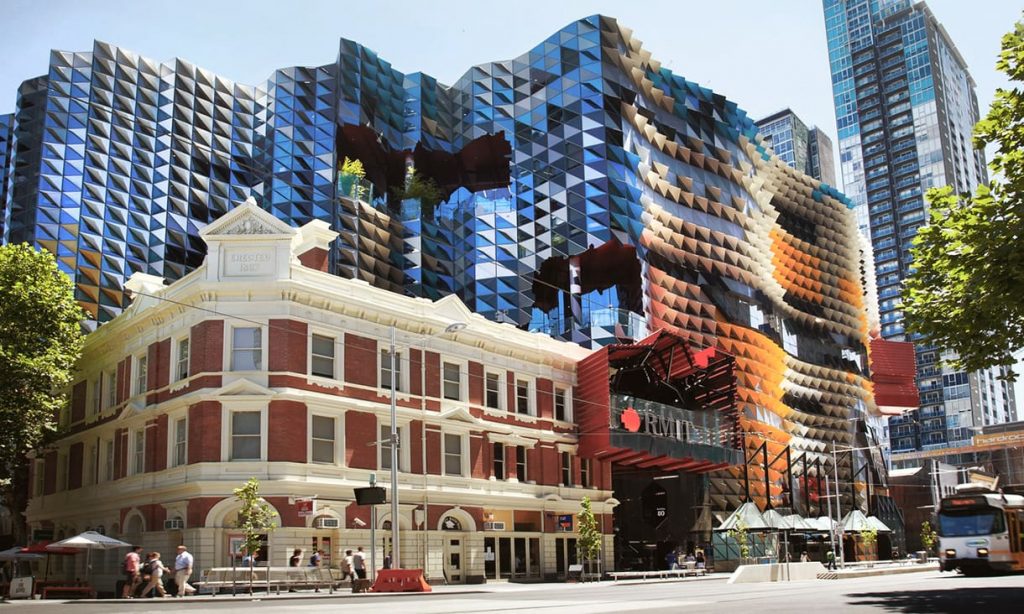
Located in Melbourne—one of the world’s most liveable and forward-thinking cities—RMIT University is renowned for its applied learning model and close industry integration. Ranked among the top young universities globally, RMIT has built a strong reputation in engineering, design, and technology education. With a network of campuses across Australia, Vietnam, and Spain, the university offers students a globally connected learning experience.
RMIT’s engineering programs are designed to reflect the realities of the modern workforce. Whether students choose to specialise in civil, electrical, mechanical, environmental, or aerospace engineering, they learn through studio-based projects, problem-solving labs, and industry challenges that mirror real-world scenarios. The curriculum balances technical depth with hands-on application, preparing students to design, build, and optimise solutions across a range of industries.
What makes engineering at RMIT unique is the direct line between classroom learning and professional practice. Through internships, co-designed projects, and innovation labs like the RMIT Advanced Manufacturing Precinct, students collaborate with industry partners to solve real engineering problems. Graduates emerge not only with strong technical foundations, but with the communication, teamwork, and adaptability skills required in today’s global engineering landscape.
QS Rankings by Subject in 2025 | #9 in Australia, #152 in the World |
Program | Bachelor of Engineering (Honours) |
Intake | February, July |
Fees (indicative in 2025) | AUD$45,120 per-year |
Duration | 4 years |
For more information on the table presented above, contact us now!
Recommended Articles to Read
Contact us to find out more!
Our consultation service centres are located in various locations in Asia and Oceania including Australia, China, Malaysia, Indonesia, Philippines, Vietnam, Fiji and many more. However, if you have a direct enquiry, you can contact us through:
Call/ WhatsApp: +60162206607
Email: [email protected]
About the author

Yellani Rasaputhra
I am a student from Monash University, Malaysia. Currently studying Bachelor of Business and Commerce majoring in International Business and Marketing. I like to spend my time painting and swimming.

